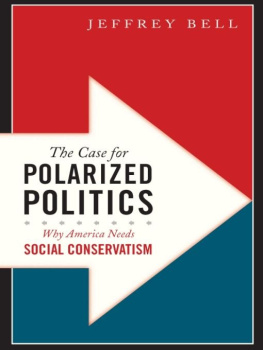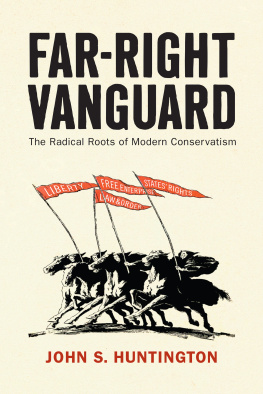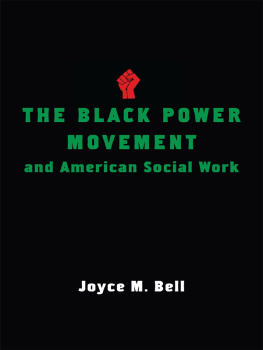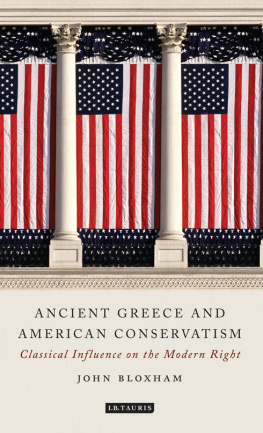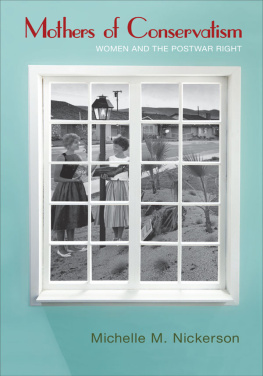INTRODUCTION
Toward the end of a long and favorable profile by Andrew Ferguson in the June 14, 2010, issue of the conservative magazine Weekly Standard, Indiana Governor Mitch Daniels told his interviewer that the next President would have to call a truce on the so-called social issues, no matter who is elected. Were going to just have to agree to get along for a little while, he said, so we can deal with the economic and financial crisis that erupted late in the second term of President George W. Bush. This crisis, politically speaking, remained the first order of business well into the second year of the Democratic presidency of Barack Obama.
A day or two after the articles appearance, another Standard reporter, John McCormack, attempted to pin Daniels down on what a truce on social issues might mean: To clarify whether Daniels simply wants to de-emphasize these issues or actually not act on them, I asked if, as president, he would issue an executive order to reinstate Reagans Mexico City Policy his first week in office. (Obama revoked the policy during his first week in office.) Daniels replied, I dont know.1
Among the policy objectives of American social conservatives, reissuing of the Mexico Cityrelated executive order by newly elected Republican presidents is one of the least risky in terms of potential political cost. First issued by President Ronald Reagan more than a quarter-century ago, it prohibits U.S. foreign-aid funds from being used for abortion services. In fact, according to a Gallup poll taken in early 2009, Obamas retraction of the Mexico City executive order in his first week in office was the only policy in the beginning stages of his administration to face majority opposition (58 percent to 35 percent) among American voters.2
Daniels, who in a long career in appointive as well as elective office had always been known as pro-life, later clarified his position, saying he would in fact sign the executive order if he were to become president. But as an instance of the coolness of top Republican leaders toward the social-conservative agenda, at a time when polls showed the GOP riding high in the 2010 midterm elections due to the continuing weak economy and the perceived ineffectuality of the Obama administration and the Democratic Congress in responding to it, the Daniels episode did not prove anomalous or isolated.
Later in the summer of 2010, popular conservative TV talk show host Glenn Beck said in an interview that when it came to social issues: Honestly, I think we have bigger fish to fry. You can argue about abortion or gay marriage all you want. The country is burning down. And when Federal district judge Vaughn Walker ruled on August 4, 2010, that the voters of California violated the U. S. Constitution by voting in 2008 to reaffirm their states traditional definition of marriage, hardly any Republican elected officials offered even a word of criticism for the judge or his decision, which (among other holdings) stated that religious-based disapproval of homosexual conduct was by its nature a form of bigotryby implication, the equivalent of a hate crime.
Then, at the end of summer, in early September, Mississippi Governor Haley Barbour, for decades one of the most influential GOP strategists and fund-raisers in national politics, weighed in. At an on-the-record press breakfast in Washington, Barbour said: I think what Mitch said is very similar to what I have responded to today. The voters have on their mind the economy, jobs, spending, debt, and taxes. And good campaigns are about the issues that are on the peoples minds.... Ill put my bona fides up against anybodys as a social conservative.... But that aint going to change anybodys vote this year because people are concerned about jobs, the economy, growth, and taxes.... You are using up valuable time and resources that can be used to talk to people about what they care about.
Shortly after Barbours advice on leaving social issues out of his partys election-year agenda, Republican congressional sources notified social-conservative activists that social issues would be systematically excluded from House Republicans Pledge to America statement to be issued in late September 2010, following the final round of primaries and less than six weeks from Election Day.
Some striking things were true about this series of events, which were themselves part of a larger question concerning the status of social conservatism. First, the palpable discomfort and disdain directed at social conservatives and their issues were expressed not by social liberalswho in recent decades have almost completely disappeared from the ranks of Republican elected officialsbut by members of the conservative and Republican elite whom most social-conservative activists consider to be fellow adherents of social conservatism.
The second striking aspect of the 2010 events is that the impulse of conservative and Republican elites to jettison or marginalize the social-conservative agenda was neither new nor surprising. It was the latest in a series of such efforts dating back at least to 1989; more often than not, these efforts came in response to social-conservative gains or its high visibility in the politics of the immediately preceding period.
The third striking feature is that, at least in the short run, the high-level, semi-orchestrated campaign to remove social issues from the partys 2010 agenda came to nothing. Social issues were included in the Pledge to America manifesto issued by House Republicans on September 23, 2010. Moreover, in high-profile 2010 Republican primaries, memorable for a spirit of antiestablishment insurgency fostered by the pro-limited-government Tea Party movement, such well-financed social liberals as Tom Campbell in California, Michael Castle in Delaware, and Bill Binnie in New Hampshire went down to resounding defeat at the hands of less well-known U.S. Senate candidates who were socially conservative. In one of the races, the Senate primary in New Hampshire, the standing of the free-spending socially liberal candidate collapsed into a distant third, while the front-running candidates fought down to the wire arguing which of the two was more authentically pro-life.
These are seemingly contradictory events that I believe have a rational explanation, which this book will attempt to offer. In recent decades, social conservatism has become not only a core component of Republican election victories, but also a defining characteristic by which Republicans know themselves and are known to others. Yet in the same era in which this was happening, much of elite Republican and conservative opinion has remained hostile to a political role for social issues, preferring they be paid no more than lip service and removed completely from political debate whenever this can be managed.
Such tension would not be possible in any other affluent democracy, because in those democracies nothing remotely resembling social conservatism exists. Its absence is the main reason the politics of Western Europe and Japan have not become polarized, and the continued presence and strength of social conservatism is the central reason politics is polarized here. Understanding why this is so, and why it is likely to continue well into the future, goes a long way toward explaining why American politics has such a different feel from the politics of other affluent democracies, as well as where our very different politics may lead.
If the analysis of social conservatism in this book is wrong, conservative Republican elites who dislike social issues will be able to safely remove such issues from their agenda without suffering serious or permanent consequences. If, on the other hand, this books analysis approximates reality, they are apt to keep reliving their multiple past experiences of finding this a more difficult separation than they expected. If, given their continued hostility, they nonetheless succeed in sidelining social conservatism, it is likely both to survive as a mass-based movement and to inflict devastating, perhaps fatal, damage to a Republican party that has cast it out.

